Hospitality Consumer Behaviour: An Analysis of Decision Making
VerifiedAdded on 2023/06/13
|15
|4421
|247
Report
AI Summary
This report provides a comprehensive analysis of consumer behaviour and insights within the hospitality sector, focusing on Sofitel London St. James Hotel as a case study. It investigates the influence of cultural, social, personal, and psychological factors on consumer attitudes and behaviours, highlighting how these factors are changing due to the impact of digital technology. The report examines the stages of the consumer decision-making journey, mapping a path to purchase for Sofitel hotel and evaluating the importance of this mapping for marketers. It also compares and contrasts the key differences in hospitality decision-making processes for B2C and B2B contexts, evaluates various market research approaches, and assesses how marketers can influence different stages of the hospitality decision-making process, providing relevant examples and models.
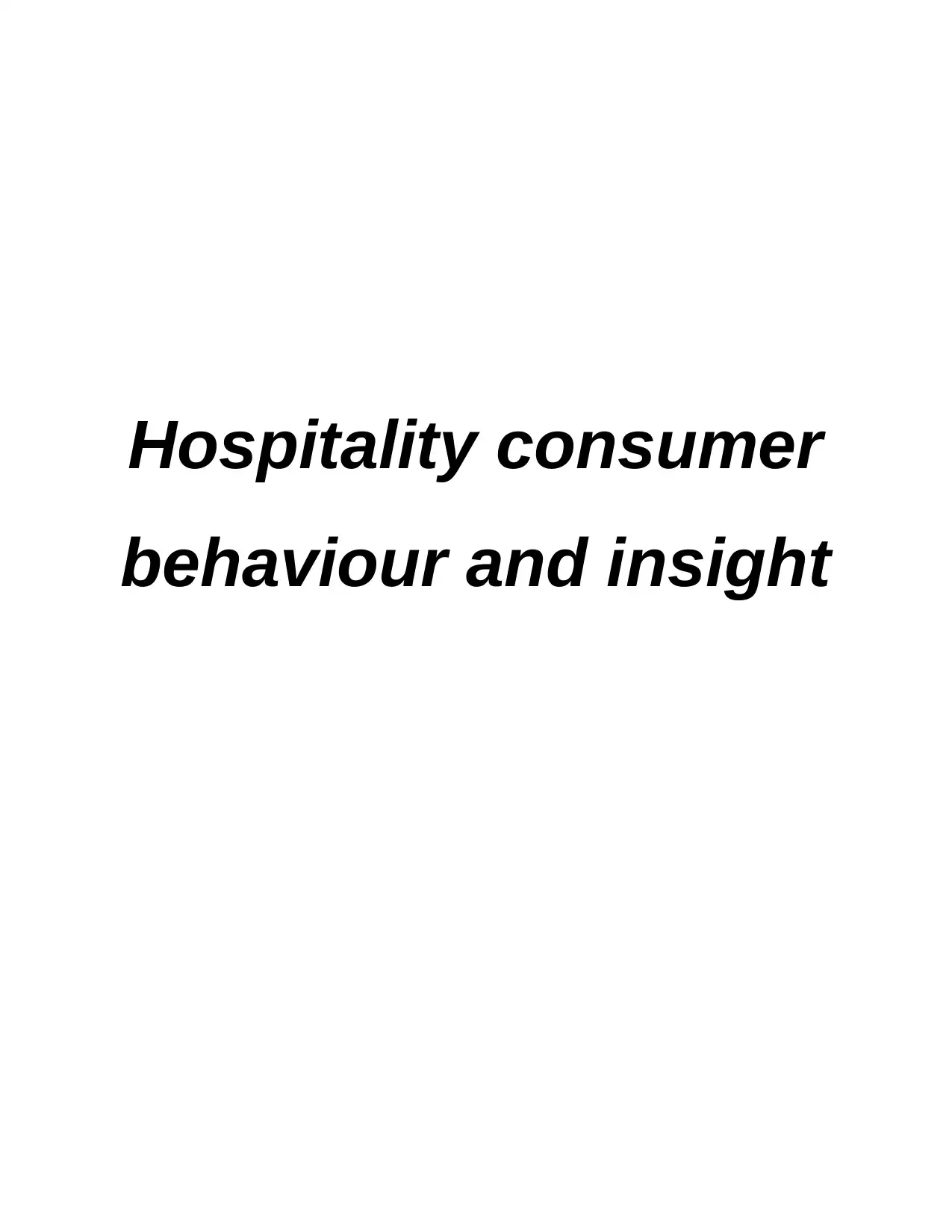
Hospitality consumer
behaviour and insight
behaviour and insight
Paraphrase This Document
Need a fresh take? Get an instant paraphrase of this document with our AI Paraphraser
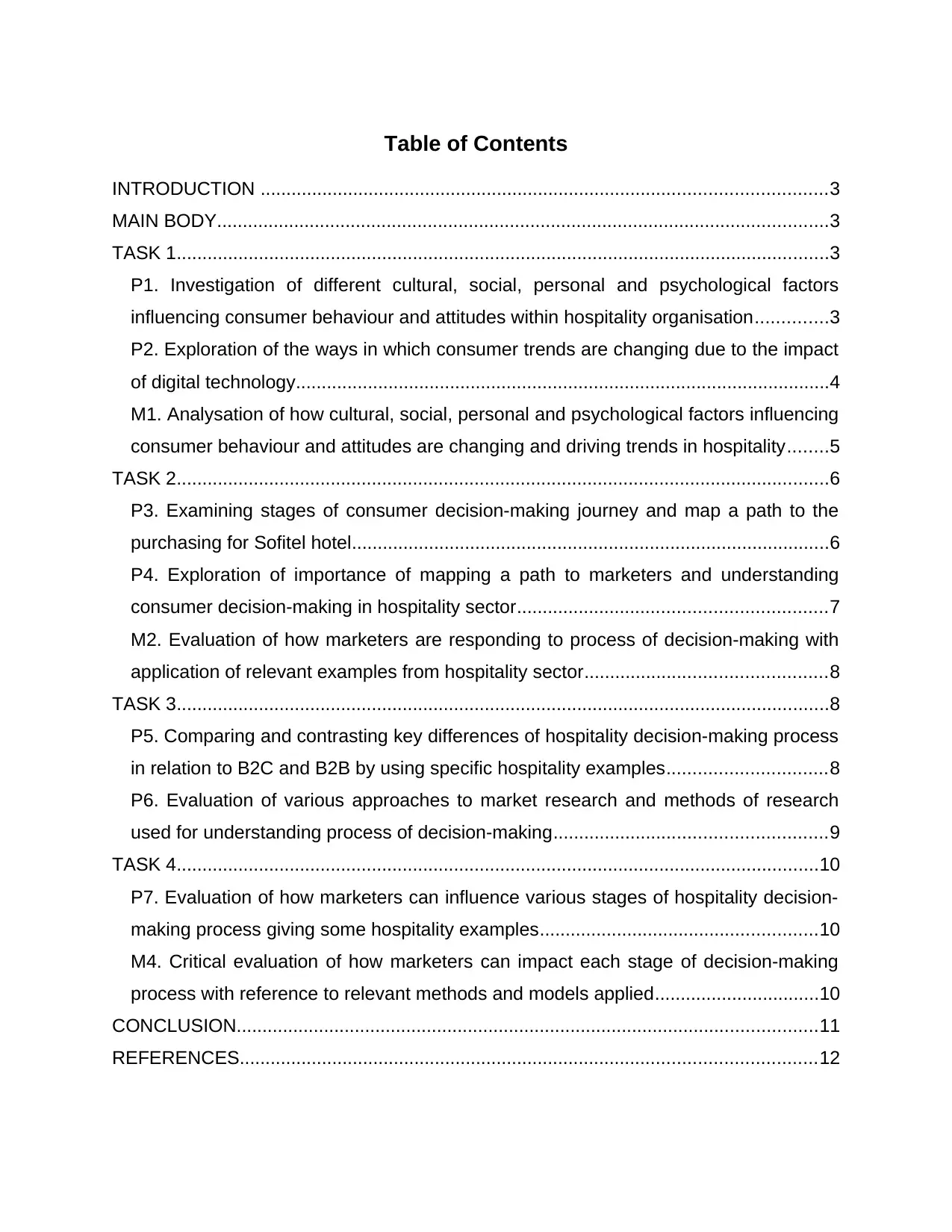
Table of Contents
INTRODUCTION ..............................................................................................................3
MAIN BODY.......................................................................................................................3
TASK 1...............................................................................................................................3
P1. Investigation of different cultural, social, personal and psychological factors
influencing consumer behaviour and attitudes within hospitality organisation..............3
P2. Exploration of the ways in which consumer trends are changing due to the impact
of digital technology........................................................................................................4
M1. Analysation of how cultural, social, personal and psychological factors influencing
consumer behaviour and attitudes are changing and driving trends in hospitality........5
TASK 2...............................................................................................................................6
P3. Examining stages of consumer decision-making journey and map a path to the
purchasing for Sofitel hotel.............................................................................................6
P4. Exploration of importance of mapping a path to marketers and understanding
consumer decision-making in hospitality sector............................................................7
M2. Evaluation of how marketers are responding to process of decision-making with
application of relevant examples from hospitality sector...............................................8
TASK 3...............................................................................................................................8
P5. Comparing and contrasting key differences of hospitality decision-making process
in relation to B2C and B2B by using specific hospitality examples...............................8
P6. Evaluation of various approaches to market research and methods of research
used for understanding process of decision-making.....................................................9
TASK 4.............................................................................................................................10
P7. Evaluation of how marketers can influence various stages of hospitality decision-
making process giving some hospitality examples......................................................10
M4. Critical evaluation of how marketers can impact each stage of decision-making
process with reference to relevant methods and models applied................................10
CONCLUSION.................................................................................................................11
REFERENCES................................................................................................................12
INTRODUCTION ..............................................................................................................3
MAIN BODY.......................................................................................................................3
TASK 1...............................................................................................................................3
P1. Investigation of different cultural, social, personal and psychological factors
influencing consumer behaviour and attitudes within hospitality organisation..............3
P2. Exploration of the ways in which consumer trends are changing due to the impact
of digital technology........................................................................................................4
M1. Analysation of how cultural, social, personal and psychological factors influencing
consumer behaviour and attitudes are changing and driving trends in hospitality........5
TASK 2...............................................................................................................................6
P3. Examining stages of consumer decision-making journey and map a path to the
purchasing for Sofitel hotel.............................................................................................6
P4. Exploration of importance of mapping a path to marketers and understanding
consumer decision-making in hospitality sector............................................................7
M2. Evaluation of how marketers are responding to process of decision-making with
application of relevant examples from hospitality sector...............................................8
TASK 3...............................................................................................................................8
P5. Comparing and contrasting key differences of hospitality decision-making process
in relation to B2C and B2B by using specific hospitality examples...............................8
P6. Evaluation of various approaches to market research and methods of research
used for understanding process of decision-making.....................................................9
TASK 4.............................................................................................................................10
P7. Evaluation of how marketers can influence various stages of hospitality decision-
making process giving some hospitality examples......................................................10
M4. Critical evaluation of how marketers can impact each stage of decision-making
process with reference to relevant methods and models applied................................10
CONCLUSION.................................................................................................................11
REFERENCES................................................................................................................12
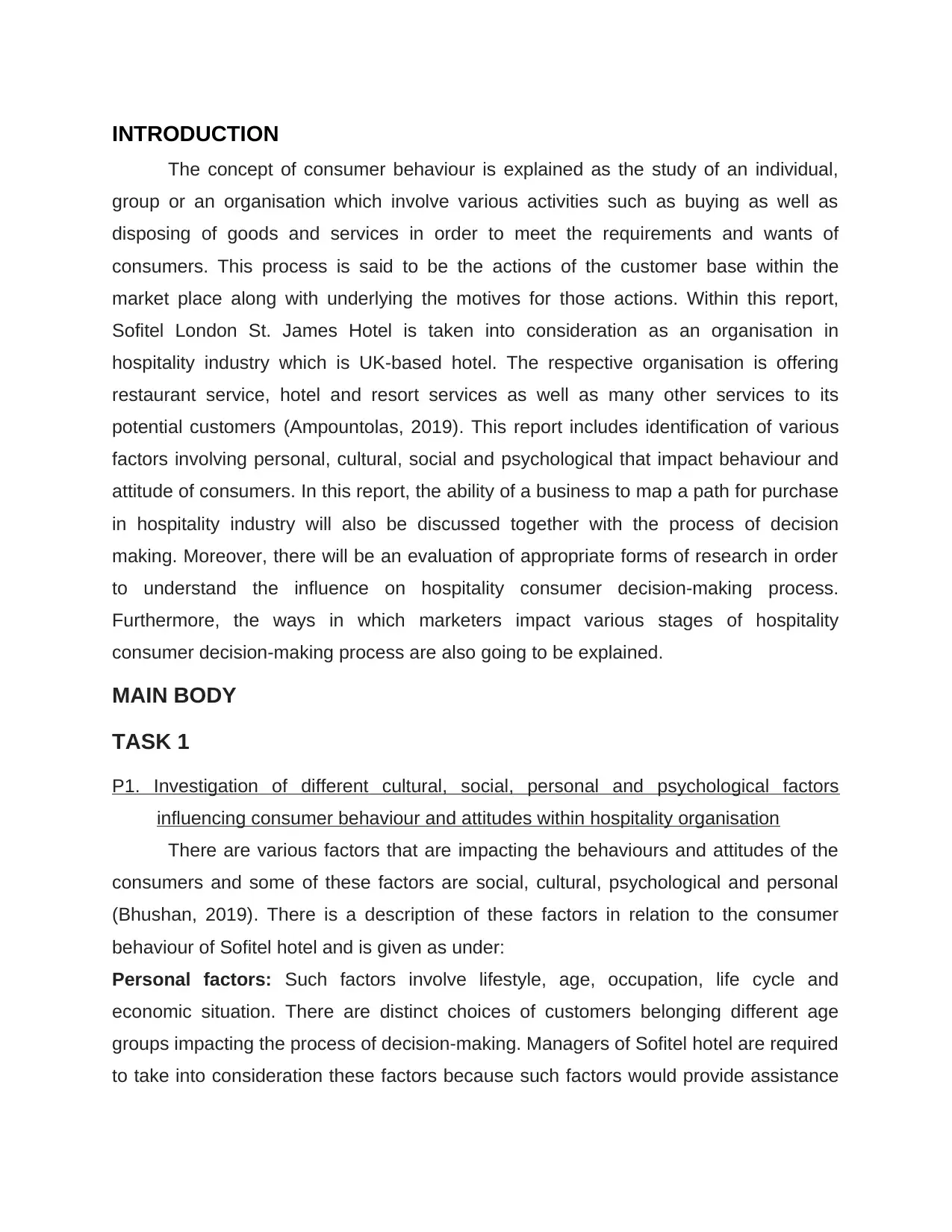
INTRODUCTION
The concept of consumer behaviour is explained as the study of an individual,
group or an organisation which involve various activities such as buying as well as
disposing of goods and services in order to meet the requirements and wants of
consumers. This process is said to be the actions of the customer base within the
market place along with underlying the motives for those actions. Within this report,
Sofitel London St. James Hotel is taken into consideration as an organisation in
hospitality industry which is UK-based hotel. The respective organisation is offering
restaurant service, hotel and resort services as well as many other services to its
potential customers (Ampountolas, 2019). This report includes identification of various
factors involving personal, cultural, social and psychological that impact behaviour and
attitude of consumers. In this report, the ability of a business to map a path for purchase
in hospitality industry will also be discussed together with the process of decision
making. Moreover, there will be an evaluation of appropriate forms of research in order
to understand the influence on hospitality consumer decision-making process.
Furthermore, the ways in which marketers impact various stages of hospitality
consumer decision-making process are also going to be explained.
MAIN BODY
TASK 1
P1. Investigation of different cultural, social, personal and psychological factors
influencing consumer behaviour and attitudes within hospitality organisation
There are various factors that are impacting the behaviours and attitudes of the
consumers and some of these factors are social, cultural, psychological and personal
(Bhushan, 2019). There is a description of these factors in relation to the consumer
behaviour of Sofitel hotel and is given as under:
Personal factors: Such factors involve lifestyle, age, occupation, life cycle and
economic situation. There are distinct choices of customers belonging different age
groups impacting the process of decision-making. Managers of Sofitel hotel are required
to take into consideration these factors because such factors would provide assistance
The concept of consumer behaviour is explained as the study of an individual,
group or an organisation which involve various activities such as buying as well as
disposing of goods and services in order to meet the requirements and wants of
consumers. This process is said to be the actions of the customer base within the
market place along with underlying the motives for those actions. Within this report,
Sofitel London St. James Hotel is taken into consideration as an organisation in
hospitality industry which is UK-based hotel. The respective organisation is offering
restaurant service, hotel and resort services as well as many other services to its
potential customers (Ampountolas, 2019). This report includes identification of various
factors involving personal, cultural, social and psychological that impact behaviour and
attitude of consumers. In this report, the ability of a business to map a path for purchase
in hospitality industry will also be discussed together with the process of decision
making. Moreover, there will be an evaluation of appropriate forms of research in order
to understand the influence on hospitality consumer decision-making process.
Furthermore, the ways in which marketers impact various stages of hospitality
consumer decision-making process are also going to be explained.
MAIN BODY
TASK 1
P1. Investigation of different cultural, social, personal and psychological factors
influencing consumer behaviour and attitudes within hospitality organisation
There are various factors that are impacting the behaviours and attitudes of the
consumers and some of these factors are social, cultural, psychological and personal
(Bhushan, 2019). There is a description of these factors in relation to the consumer
behaviour of Sofitel hotel and is given as under:
Personal factors: Such factors involve lifestyle, age, occupation, life cycle and
economic situation. There are distinct choices of customers belonging different age
groups impacting the process of decision-making. Managers of Sofitel hotel are required
to take into consideration these factors because such factors would provide assistance
⊘ This is a preview!⊘
Do you want full access?
Subscribe today to unlock all pages.

Trusted by 1+ million students worldwide
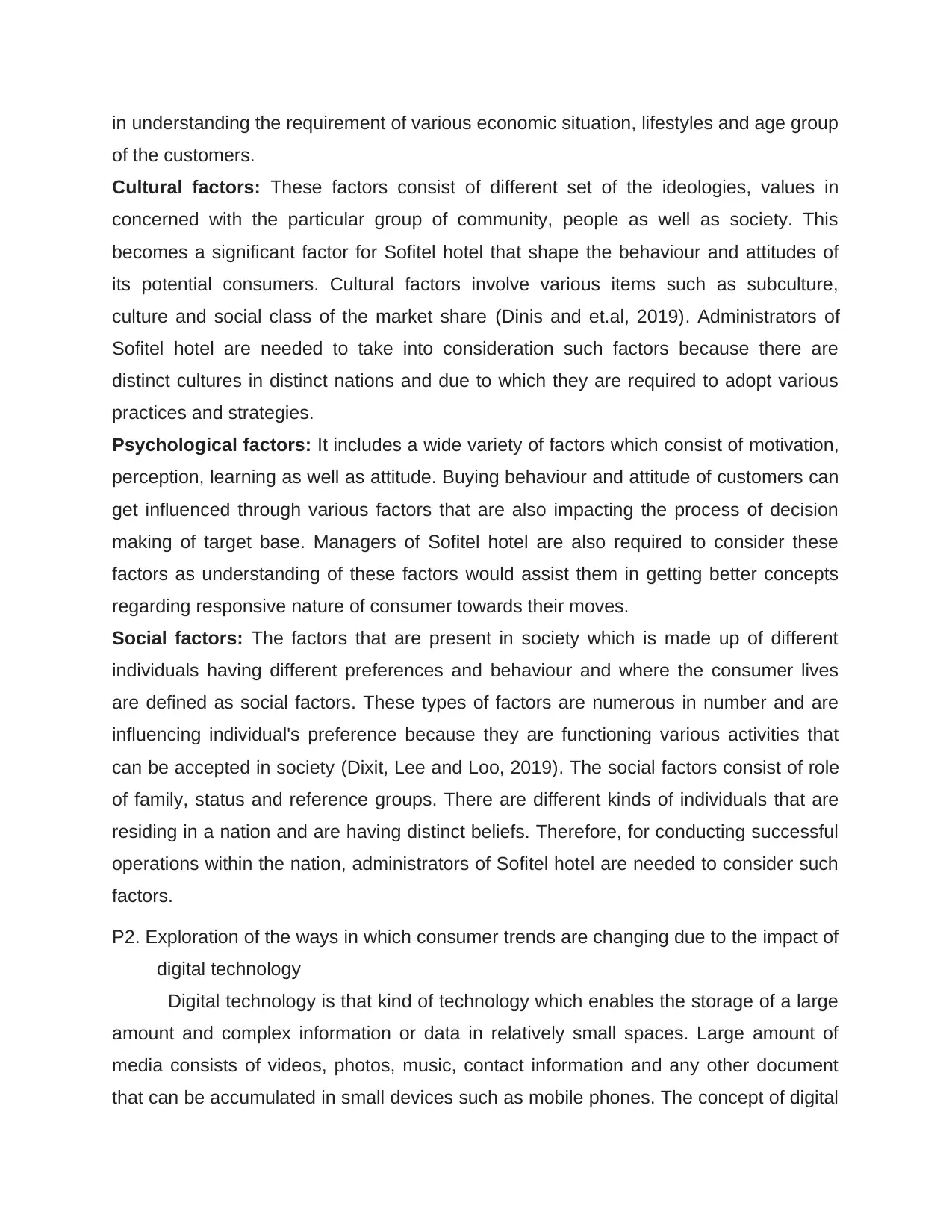
in understanding the requirement of various economic situation, lifestyles and age group
of the customers.
Cultural factors: These factors consist of different set of the ideologies, values in
concerned with the particular group of community, people as well as society. This
becomes a significant factor for Sofitel hotel that shape the behaviour and attitudes of
its potential consumers. Cultural factors involve various items such as subculture,
culture and social class of the market share (Dinis and et.al, 2019). Administrators of
Sofitel hotel are needed to take into consideration such factors because there are
distinct cultures in distinct nations and due to which they are required to adopt various
practices and strategies.
Psychological factors: It includes a wide variety of factors which consist of motivation,
perception, learning as well as attitude. Buying behaviour and attitude of customers can
get influenced through various factors that are also impacting the process of decision
making of target base. Managers of Sofitel hotel are also required to consider these
factors as understanding of these factors would assist them in getting better concepts
regarding responsive nature of consumer towards their moves.
Social factors: The factors that are present in society which is made up of different
individuals having different preferences and behaviour and where the consumer lives
are defined as social factors. These types of factors are numerous in number and are
influencing individual's preference because they are functioning various activities that
can be accepted in society (Dixit, Lee and Loo, 2019). The social factors consist of role
of family, status and reference groups. There are different kinds of individuals that are
residing in a nation and are having distinct beliefs. Therefore, for conducting successful
operations within the nation, administrators of Sofitel hotel are needed to consider such
factors.
P2. Exploration of the ways in which consumer trends are changing due to the impact of
digital technology
Digital technology is that kind of technology which enables the storage of a large
amount and complex information or data in relatively small spaces. Large amount of
media consists of videos, photos, music, contact information and any other document
that can be accumulated in small devices such as mobile phones. The concept of digital
of the customers.
Cultural factors: These factors consist of different set of the ideologies, values in
concerned with the particular group of community, people as well as society. This
becomes a significant factor for Sofitel hotel that shape the behaviour and attitudes of
its potential consumers. Cultural factors involve various items such as subculture,
culture and social class of the market share (Dinis and et.al, 2019). Administrators of
Sofitel hotel are needed to take into consideration such factors because there are
distinct cultures in distinct nations and due to which they are required to adopt various
practices and strategies.
Psychological factors: It includes a wide variety of factors which consist of motivation,
perception, learning as well as attitude. Buying behaviour and attitude of customers can
get influenced through various factors that are also impacting the process of decision
making of target base. Managers of Sofitel hotel are also required to consider these
factors as understanding of these factors would assist them in getting better concepts
regarding responsive nature of consumer towards their moves.
Social factors: The factors that are present in society which is made up of different
individuals having different preferences and behaviour and where the consumer lives
are defined as social factors. These types of factors are numerous in number and are
influencing individual's preference because they are functioning various activities that
can be accepted in society (Dixit, Lee and Loo, 2019). The social factors consist of role
of family, status and reference groups. There are different kinds of individuals that are
residing in a nation and are having distinct beliefs. Therefore, for conducting successful
operations within the nation, administrators of Sofitel hotel are needed to consider such
factors.
P2. Exploration of the ways in which consumer trends are changing due to the impact of
digital technology
Digital technology is that kind of technology which enables the storage of a large
amount and complex information or data in relatively small spaces. Large amount of
media consists of videos, photos, music, contact information and any other document
that can be accumulated in small devices such as mobile phones. The concept of digital
Paraphrase This Document
Need a fresh take? Get an instant paraphrase of this document with our AI Paraphraser
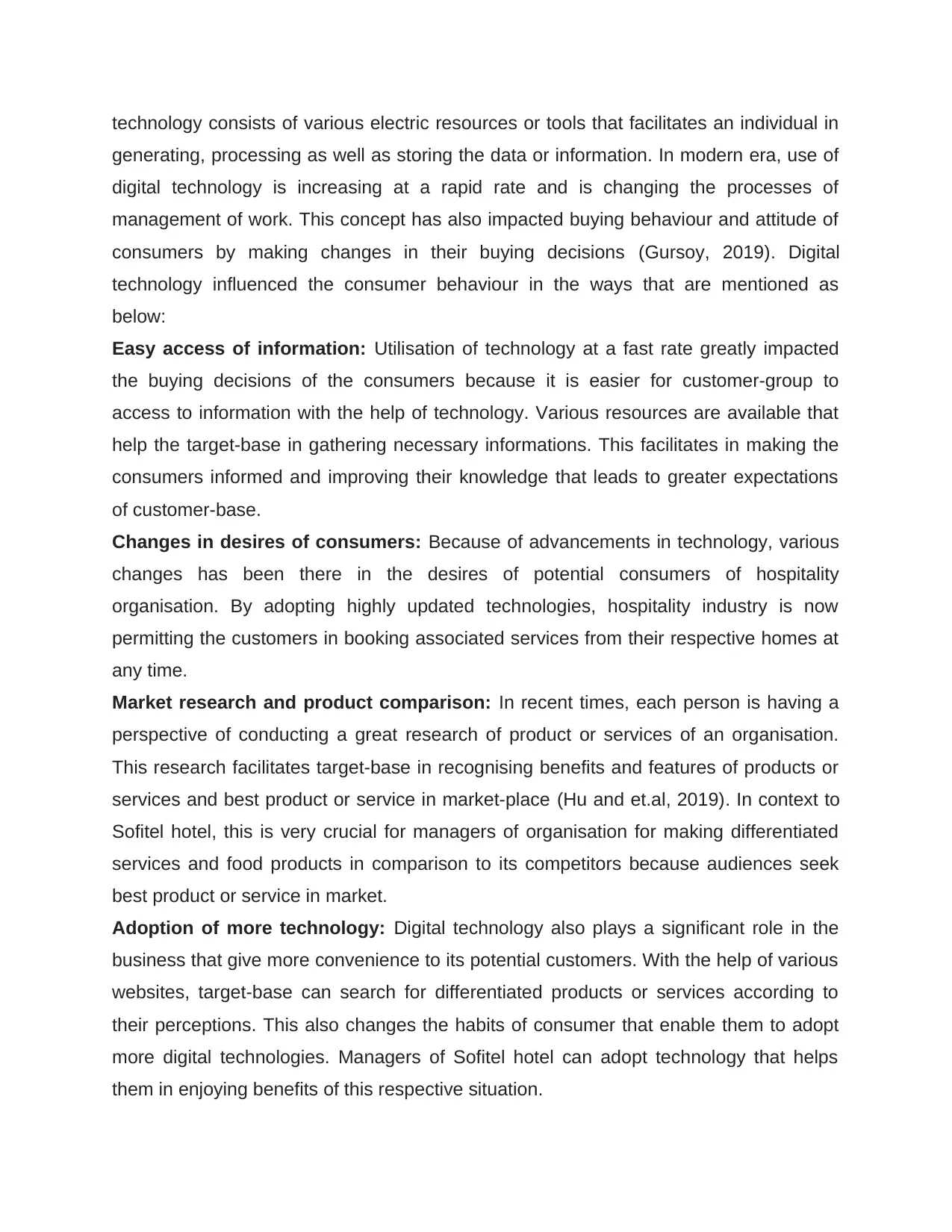
technology consists of various electric resources or tools that facilitates an individual in
generating, processing as well as storing the data or information. In modern era, use of
digital technology is increasing at a rapid rate and is changing the processes of
management of work. This concept has also impacted buying behaviour and attitude of
consumers by making changes in their buying decisions (Gursoy, 2019). Digital
technology influenced the consumer behaviour in the ways that are mentioned as
below:
Easy access of information: Utilisation of technology at a fast rate greatly impacted
the buying decisions of the consumers because it is easier for customer-group to
access to information with the help of technology. Various resources are available that
help the target-base in gathering necessary informations. This facilitates in making the
consumers informed and improving their knowledge that leads to greater expectations
of customer-base.
Changes in desires of consumers: Because of advancements in technology, various
changes has been there in the desires of potential consumers of hospitality
organisation. By adopting highly updated technologies, hospitality industry is now
permitting the customers in booking associated services from their respective homes at
any time.
Market research and product comparison: In recent times, each person is having a
perspective of conducting a great research of product or services of an organisation.
This research facilitates target-base in recognising benefits and features of products or
services and best product or service in market-place (Hu and et.al, 2019). In context to
Sofitel hotel, this is very crucial for managers of organisation for making differentiated
services and food products in comparison to its competitors because audiences seek
best product or service in market.
Adoption of more technology: Digital technology also plays a significant role in the
business that give more convenience to its potential customers. With the help of various
websites, target-base can search for differentiated products or services according to
their perceptions. This also changes the habits of consumer that enable them to adopt
more digital technologies. Managers of Sofitel hotel can adopt technology that helps
them in enjoying benefits of this respective situation.
generating, processing as well as storing the data or information. In modern era, use of
digital technology is increasing at a rapid rate and is changing the processes of
management of work. This concept has also impacted buying behaviour and attitude of
consumers by making changes in their buying decisions (Gursoy, 2019). Digital
technology influenced the consumer behaviour in the ways that are mentioned as
below:
Easy access of information: Utilisation of technology at a fast rate greatly impacted
the buying decisions of the consumers because it is easier for customer-group to
access to information with the help of technology. Various resources are available that
help the target-base in gathering necessary informations. This facilitates in making the
consumers informed and improving their knowledge that leads to greater expectations
of customer-base.
Changes in desires of consumers: Because of advancements in technology, various
changes has been there in the desires of potential consumers of hospitality
organisation. By adopting highly updated technologies, hospitality industry is now
permitting the customers in booking associated services from their respective homes at
any time.
Market research and product comparison: In recent times, each person is having a
perspective of conducting a great research of product or services of an organisation.
This research facilitates target-base in recognising benefits and features of products or
services and best product or service in market-place (Hu and et.al, 2019). In context to
Sofitel hotel, this is very crucial for managers of organisation for making differentiated
services and food products in comparison to its competitors because audiences seek
best product or service in market.
Adoption of more technology: Digital technology also plays a significant role in the
business that give more convenience to its potential customers. With the help of various
websites, target-base can search for differentiated products or services according to
their perceptions. This also changes the habits of consumer that enable them to adopt
more digital technologies. Managers of Sofitel hotel can adopt technology that helps
them in enjoying benefits of this respective situation.
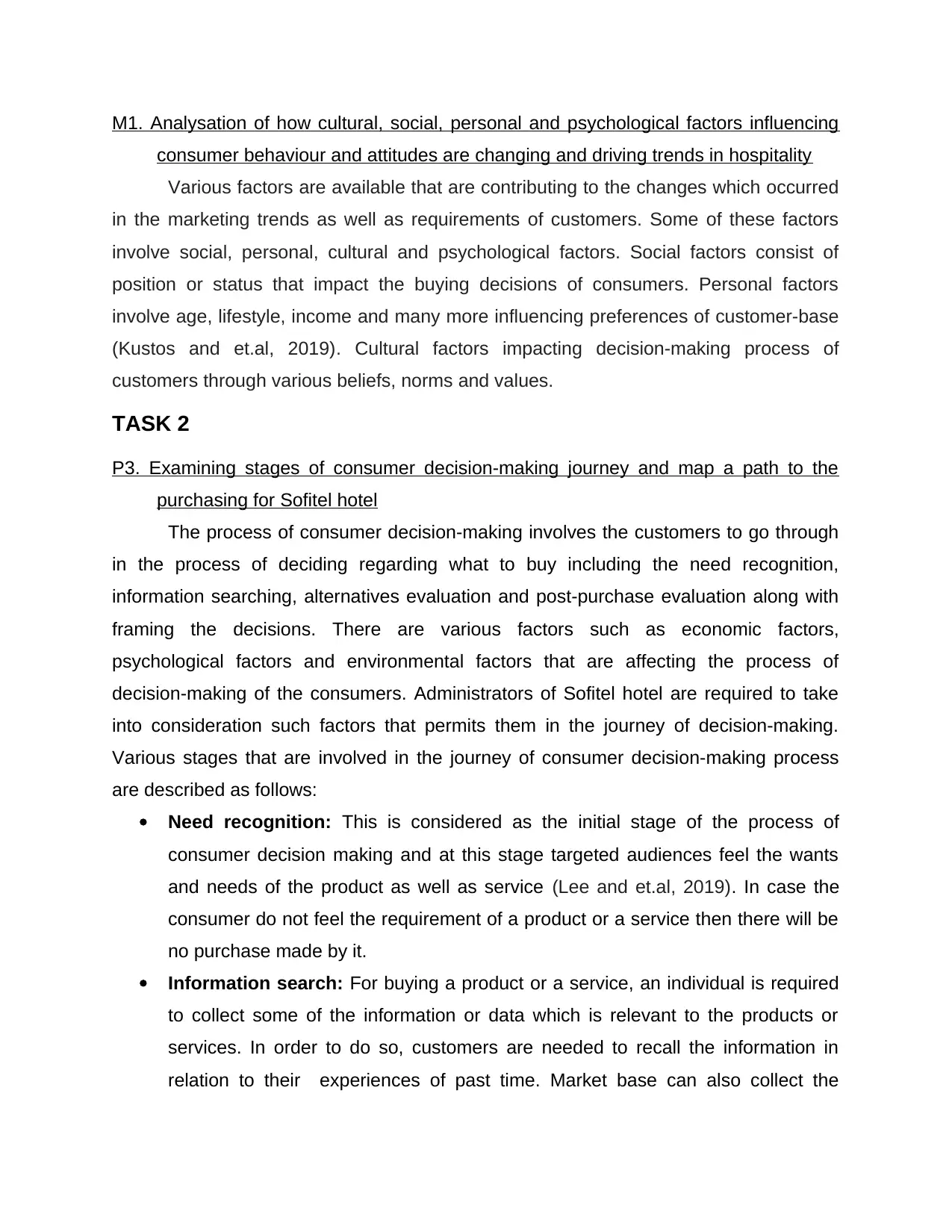
M1. Analysation of how cultural, social, personal and psychological factors influencing
consumer behaviour and attitudes are changing and driving trends in hospitality
Various factors are available that are contributing to the changes which occurred
in the marketing trends as well as requirements of customers. Some of these factors
involve social, personal, cultural and psychological factors. Social factors consist of
position or status that impact the buying decisions of consumers. Personal factors
involve age, lifestyle, income and many more influencing preferences of customer-base
(Kustos and et.al, 2019). Cultural factors impacting decision-making process of
customers through various beliefs, norms and values.
TASK 2
P3. Examining stages of consumer decision-making journey and map a path to the
purchasing for Sofitel hotel
The process of consumer decision-making involves the customers to go through
in the process of deciding regarding what to buy including the need recognition,
information searching, alternatives evaluation and post-purchase evaluation along with
framing the decisions. There are various factors such as economic factors,
psychological factors and environmental factors that are affecting the process of
decision-making of the consumers. Administrators of Sofitel hotel are required to take
into consideration such factors that permits them in the journey of decision-making.
Various stages that are involved in the journey of consumer decision-making process
are described as follows:
Need recognition: This is considered as the initial stage of the process of
consumer decision making and at this stage targeted audiences feel the wants
and needs of the product as well as service (Lee and et.al, 2019). In case the
consumer do not feel the requirement of a product or a service then there will be
no purchase made by it.
Information search: For buying a product or a service, an individual is required
to collect some of the information or data which is relevant to the products or
services. In order to do so, customers are needed to recall the information in
relation to their experiences of past time. Market base can also collect the
consumer behaviour and attitudes are changing and driving trends in hospitality
Various factors are available that are contributing to the changes which occurred
in the marketing trends as well as requirements of customers. Some of these factors
involve social, personal, cultural and psychological factors. Social factors consist of
position or status that impact the buying decisions of consumers. Personal factors
involve age, lifestyle, income and many more influencing preferences of customer-base
(Kustos and et.al, 2019). Cultural factors impacting decision-making process of
customers through various beliefs, norms and values.
TASK 2
P3. Examining stages of consumer decision-making journey and map a path to the
purchasing for Sofitel hotel
The process of consumer decision-making involves the customers to go through
in the process of deciding regarding what to buy including the need recognition,
information searching, alternatives evaluation and post-purchase evaluation along with
framing the decisions. There are various factors such as economic factors,
psychological factors and environmental factors that are affecting the process of
decision-making of the consumers. Administrators of Sofitel hotel are required to take
into consideration such factors that permits them in the journey of decision-making.
Various stages that are involved in the journey of consumer decision-making process
are described as follows:
Need recognition: This is considered as the initial stage of the process of
consumer decision making and at this stage targeted audiences feel the wants
and needs of the product as well as service (Lee and et.al, 2019). In case the
consumer do not feel the requirement of a product or a service then there will be
no purchase made by it.
Information search: For buying a product or a service, an individual is required
to collect some of the information or data which is relevant to the products or
services. In order to do so, customers are needed to recall the information in
relation to their experiences of past time. Market base can also collect the
⊘ This is a preview!⊘
Do you want full access?
Subscribe today to unlock all pages.

Trusted by 1+ million students worldwide
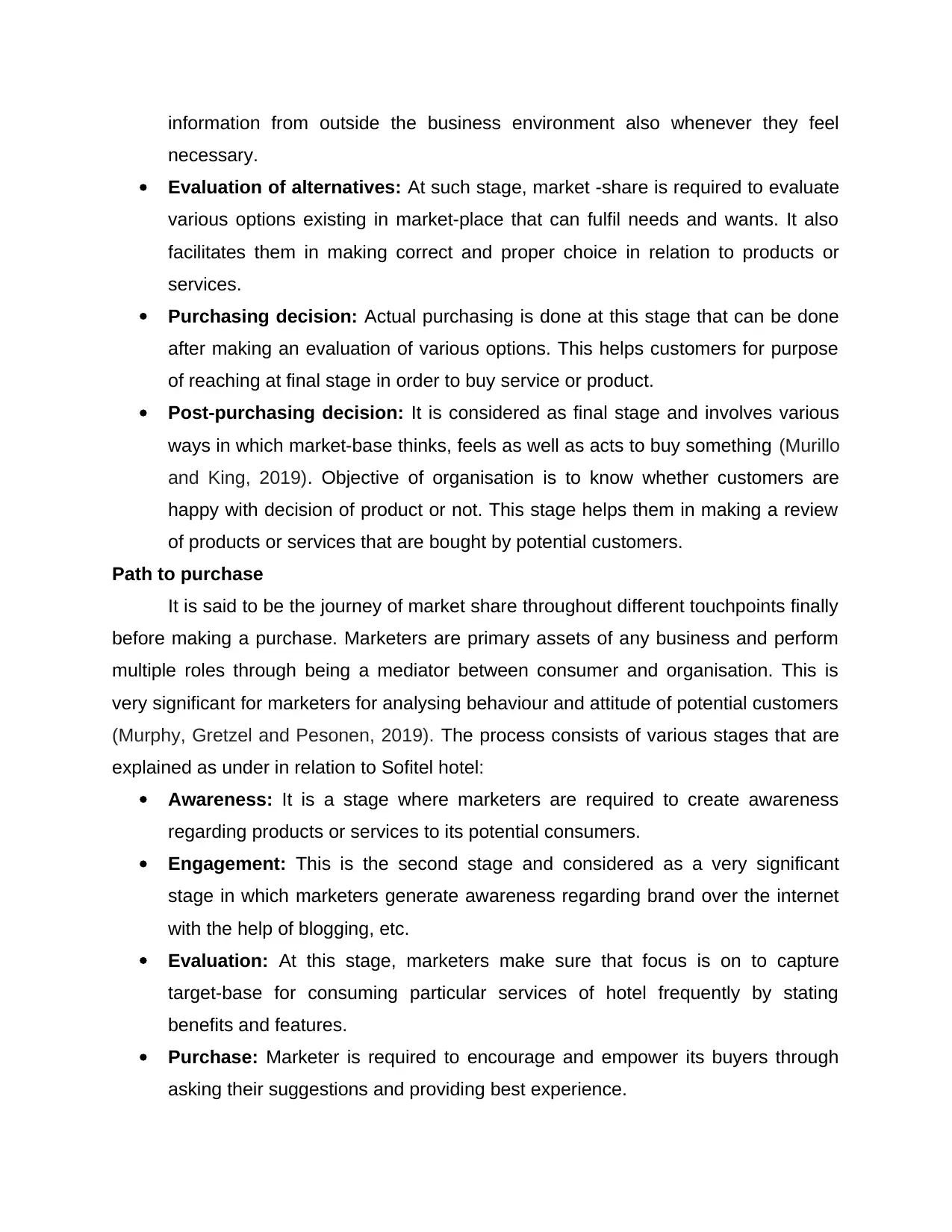
information from outside the business environment also whenever they feel
necessary.
Evaluation of alternatives: At such stage, market -share is required to evaluate
various options existing in market-place that can fulfil needs and wants. It also
facilitates them in making correct and proper choice in relation to products or
services.
Purchasing decision: Actual purchasing is done at this stage that can be done
after making an evaluation of various options. This helps customers for purpose
of reaching at final stage in order to buy service or product.
Post-purchasing decision: It is considered as final stage and involves various
ways in which market-base thinks, feels as well as acts to buy something (Murillo
and King, 2019). Objective of organisation is to know whether customers are
happy with decision of product or not. This stage helps them in making a review
of products or services that are bought by potential customers.
Path to purchase
It is said to be the journey of market share throughout different touchpoints finally
before making a purchase. Marketers are primary assets of any business and perform
multiple roles through being a mediator between consumer and organisation. This is
very significant for marketers for analysing behaviour and attitude of potential customers
(Murphy, Gretzel and Pesonen, 2019). The process consists of various stages that are
explained as under in relation to Sofitel hotel:
Awareness: It is a stage where marketers are required to create awareness
regarding products or services to its potential consumers.
Engagement: This is the second stage and considered as a very significant
stage in which marketers generate awareness regarding brand over the internet
with the help of blogging, etc.
Evaluation: At this stage, marketers make sure that focus is on to capture
target-base for consuming particular services of hotel frequently by stating
benefits and features.
Purchase: Marketer is required to encourage and empower its buyers through
asking their suggestions and providing best experience.
necessary.
Evaluation of alternatives: At such stage, market -share is required to evaluate
various options existing in market-place that can fulfil needs and wants. It also
facilitates them in making correct and proper choice in relation to products or
services.
Purchasing decision: Actual purchasing is done at this stage that can be done
after making an evaluation of various options. This helps customers for purpose
of reaching at final stage in order to buy service or product.
Post-purchasing decision: It is considered as final stage and involves various
ways in which market-base thinks, feels as well as acts to buy something (Murillo
and King, 2019). Objective of organisation is to know whether customers are
happy with decision of product or not. This stage helps them in making a review
of products or services that are bought by potential customers.
Path to purchase
It is said to be the journey of market share throughout different touchpoints finally
before making a purchase. Marketers are primary assets of any business and perform
multiple roles through being a mediator between consumer and organisation. This is
very significant for marketers for analysing behaviour and attitude of potential customers
(Murphy, Gretzel and Pesonen, 2019). The process consists of various stages that are
explained as under in relation to Sofitel hotel:
Awareness: It is a stage where marketers are required to create awareness
regarding products or services to its potential consumers.
Engagement: This is the second stage and considered as a very significant
stage in which marketers generate awareness regarding brand over the internet
with the help of blogging, etc.
Evaluation: At this stage, marketers make sure that focus is on to capture
target-base for consuming particular services of hotel frequently by stating
benefits and features.
Purchase: Marketer is required to encourage and empower its buyers through
asking their suggestions and providing best experience.
Paraphrase This Document
Need a fresh take? Get an instant paraphrase of this document with our AI Paraphraser
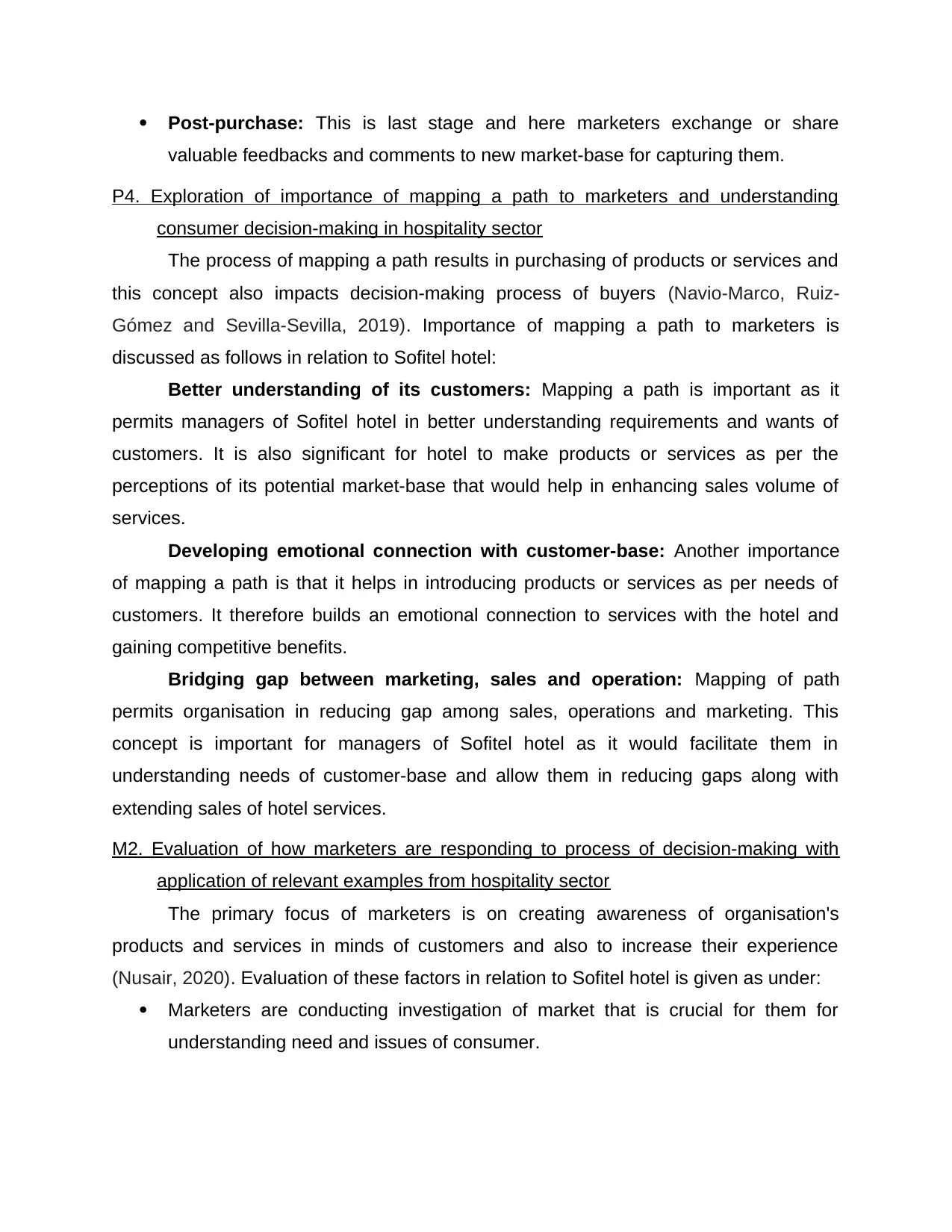
Post-purchase: This is last stage and here marketers exchange or share
valuable feedbacks and comments to new market-base for capturing them.
P4. Exploration of importance of mapping a path to marketers and understanding
consumer decision-making in hospitality sector
The process of mapping a path results in purchasing of products or services and
this concept also impacts decision-making process of buyers (Navio-Marco, Ruiz-
Gómez and Sevilla-Sevilla, 2019). Importance of mapping a path to marketers is
discussed as follows in relation to Sofitel hotel:
Better understanding of its customers: Mapping a path is important as it
permits managers of Sofitel hotel in better understanding requirements and wants of
customers. It is also significant for hotel to make products or services as per the
perceptions of its potential market-base that would help in enhancing sales volume of
services.
Developing emotional connection with customer-base: Another importance
of mapping a path is that it helps in introducing products or services as per needs of
customers. It therefore builds an emotional connection to services with the hotel and
gaining competitive benefits.
Bridging gap between marketing, sales and operation: Mapping of path
permits organisation in reducing gap among sales, operations and marketing. This
concept is important for managers of Sofitel hotel as it would facilitate them in
understanding needs of customer-base and allow them in reducing gaps along with
extending sales of hotel services.
M2. Evaluation of how marketers are responding to process of decision-making with
application of relevant examples from hospitality sector
The primary focus of marketers is on creating awareness of organisation's
products and services in minds of customers and also to increase their experience
(Nusair, 2020). Evaluation of these factors in relation to Sofitel hotel is given as under:
Marketers are conducting investigation of market that is crucial for them for
understanding need and issues of consumer.
valuable feedbacks and comments to new market-base for capturing them.
P4. Exploration of importance of mapping a path to marketers and understanding
consumer decision-making in hospitality sector
The process of mapping a path results in purchasing of products or services and
this concept also impacts decision-making process of buyers (Navio-Marco, Ruiz-
Gómez and Sevilla-Sevilla, 2019). Importance of mapping a path to marketers is
discussed as follows in relation to Sofitel hotel:
Better understanding of its customers: Mapping a path is important as it
permits managers of Sofitel hotel in better understanding requirements and wants of
customers. It is also significant for hotel to make products or services as per the
perceptions of its potential market-base that would help in enhancing sales volume of
services.
Developing emotional connection with customer-base: Another importance
of mapping a path is that it helps in introducing products or services as per needs of
customers. It therefore builds an emotional connection to services with the hotel and
gaining competitive benefits.
Bridging gap between marketing, sales and operation: Mapping of path
permits organisation in reducing gap among sales, operations and marketing. This
concept is important for managers of Sofitel hotel as it would facilitate them in
understanding needs of customer-base and allow them in reducing gaps along with
extending sales of hotel services.
M2. Evaluation of how marketers are responding to process of decision-making with
application of relevant examples from hospitality sector
The primary focus of marketers is on creating awareness of organisation's
products and services in minds of customers and also to increase their experience
(Nusair, 2020). Evaluation of these factors in relation to Sofitel hotel is given as under:
Marketers are conducting investigation of market that is crucial for them for
understanding need and issues of consumer.
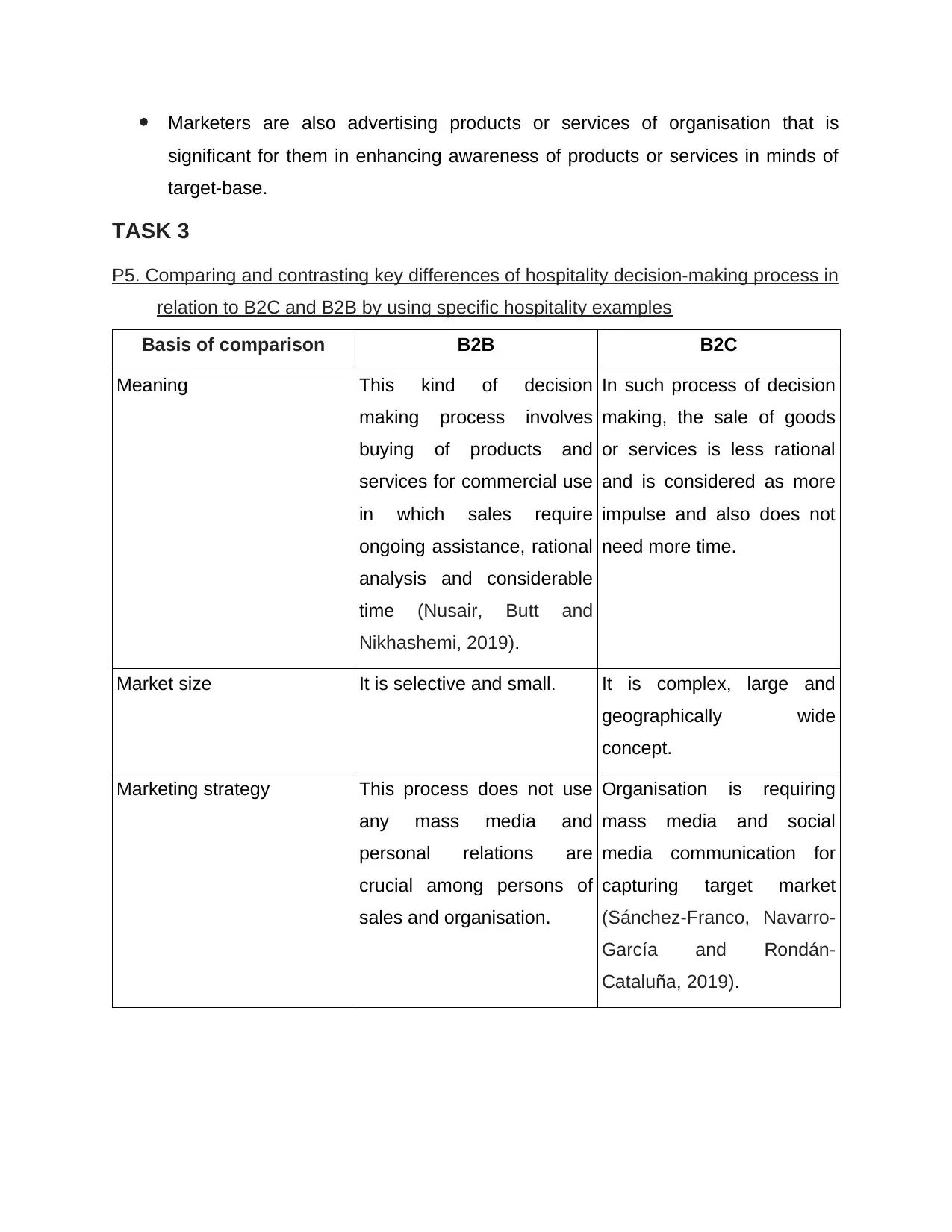
Marketers are also advertising products or services of organisation that is
significant for them in enhancing awareness of products or services in minds of
target-base.
TASK 3
P5. Comparing and contrasting key differences of hospitality decision-making process in
relation to B2C and B2B by using specific hospitality examples
Basis of comparison B2B B2C
Meaning This kind of decision
making process involves
buying of products and
services for commercial use
in which sales require
ongoing assistance, rational
analysis and considerable
time (Nusair, Butt and
Nikhashemi, 2019).
In such process of decision
making, the sale of goods
or services is less rational
and is considered as more
impulse and also does not
need more time.
Market size It is selective and small. It is complex, large and
geographically wide
concept.
Marketing strategy This process does not use
any mass media and
personal relations are
crucial among persons of
sales and organisation.
Organisation is requiring
mass media and social
media communication for
capturing target market
(Sánchez-Franco, Navarro-
García and Rondán-
Cataluña, 2019).
significant for them in enhancing awareness of products or services in minds of
target-base.
TASK 3
P5. Comparing and contrasting key differences of hospitality decision-making process in
relation to B2C and B2B by using specific hospitality examples
Basis of comparison B2B B2C
Meaning This kind of decision
making process involves
buying of products and
services for commercial use
in which sales require
ongoing assistance, rational
analysis and considerable
time (Nusair, Butt and
Nikhashemi, 2019).
In such process of decision
making, the sale of goods
or services is less rational
and is considered as more
impulse and also does not
need more time.
Market size It is selective and small. It is complex, large and
geographically wide
concept.
Marketing strategy This process does not use
any mass media and
personal relations are
crucial among persons of
sales and organisation.
Organisation is requiring
mass media and social
media communication for
capturing target market
(Sánchez-Franco, Navarro-
García and Rondán-
Cataluña, 2019).
⊘ This is a preview!⊘
Do you want full access?
Subscribe today to unlock all pages.

Trusted by 1+ million students worldwide
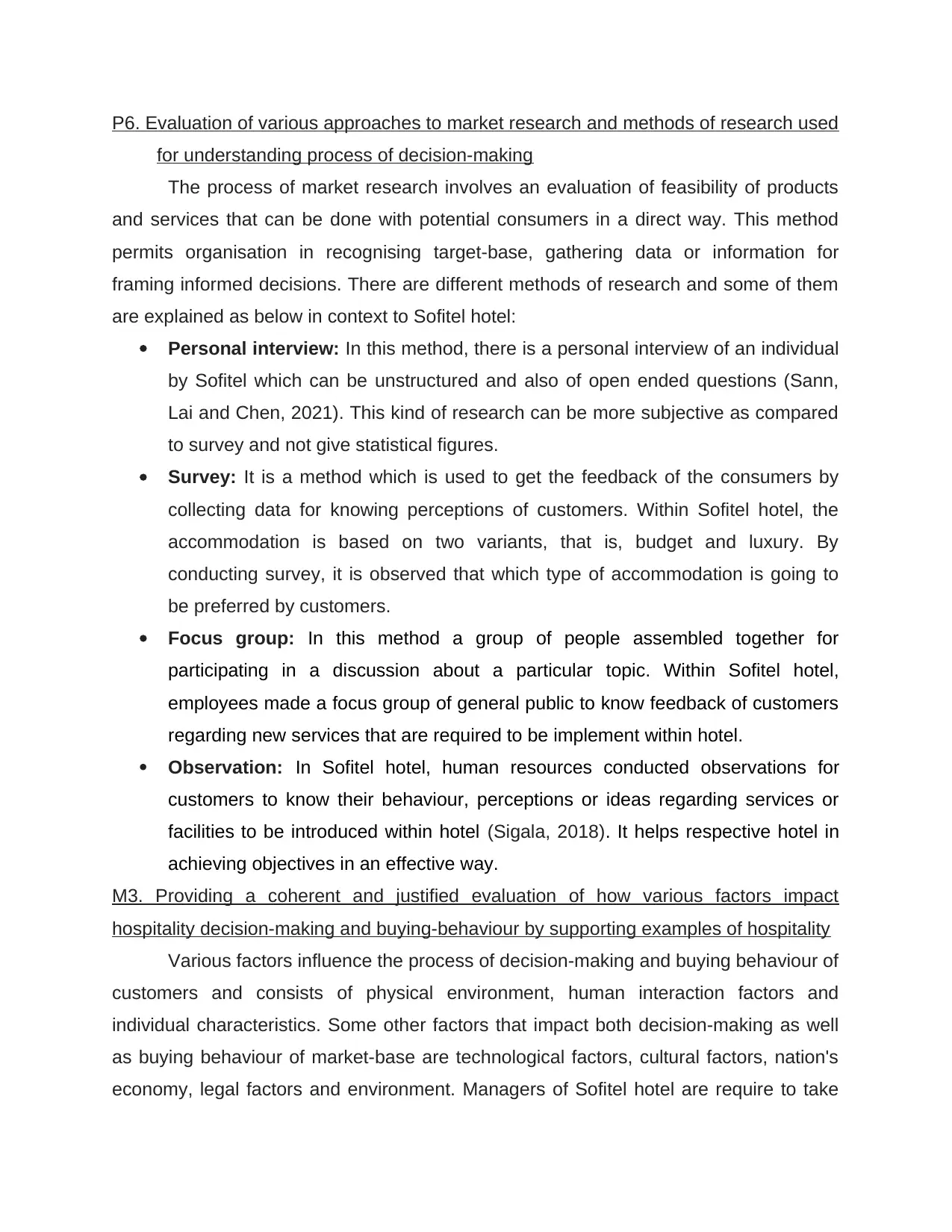
P6. Evaluation of various approaches to market research and methods of research used
for understanding process of decision-making
The process of market research involves an evaluation of feasibility of products
and services that can be done with potential consumers in a direct way. This method
permits organisation in recognising target-base, gathering data or information for
framing informed decisions. There are different methods of research and some of them
are explained as below in context to Sofitel hotel:
Personal interview: In this method, there is a personal interview of an individual
by Sofitel which can be unstructured and also of open ended questions (Sann,
Lai and Chen, 2021). This kind of research can be more subjective as compared
to survey and not give statistical figures.
Survey: It is a method which is used to get the feedback of the consumers by
collecting data for knowing perceptions of customers. Within Sofitel hotel, the
accommodation is based on two variants, that is, budget and luxury. By
conducting survey, it is observed that which type of accommodation is going to
be preferred by customers.
Focus group: In this method a group of people assembled together for
participating in a discussion about a particular topic. Within Sofitel hotel,
employees made a focus group of general public to know feedback of customers
regarding new services that are required to be implement within hotel.
Observation: In Sofitel hotel, human resources conducted observations for
customers to know their behaviour, perceptions or ideas regarding services or
facilities to be introduced within hotel (Sigala, 2018). It helps respective hotel in
achieving objectives in an effective way.
M3. Providing a coherent and justified evaluation of how various factors impact
hospitality decision-making and buying-behaviour by supporting examples of hospitality
Various factors influence the process of decision-making and buying behaviour of
customers and consists of physical environment, human interaction factors and
individual characteristics. Some other factors that impact both decision-making as well
as buying behaviour of market-base are technological factors, cultural factors, nation's
economy, legal factors and environment. Managers of Sofitel hotel are require to take
for understanding process of decision-making
The process of market research involves an evaluation of feasibility of products
and services that can be done with potential consumers in a direct way. This method
permits organisation in recognising target-base, gathering data or information for
framing informed decisions. There are different methods of research and some of them
are explained as below in context to Sofitel hotel:
Personal interview: In this method, there is a personal interview of an individual
by Sofitel which can be unstructured and also of open ended questions (Sann,
Lai and Chen, 2021). This kind of research can be more subjective as compared
to survey and not give statistical figures.
Survey: It is a method which is used to get the feedback of the consumers by
collecting data for knowing perceptions of customers. Within Sofitel hotel, the
accommodation is based on two variants, that is, budget and luxury. By
conducting survey, it is observed that which type of accommodation is going to
be preferred by customers.
Focus group: In this method a group of people assembled together for
participating in a discussion about a particular topic. Within Sofitel hotel,
employees made a focus group of general public to know feedback of customers
regarding new services that are required to be implement within hotel.
Observation: In Sofitel hotel, human resources conducted observations for
customers to know their behaviour, perceptions or ideas regarding services or
facilities to be introduced within hotel (Sigala, 2018). It helps respective hotel in
achieving objectives in an effective way.
M3. Providing a coherent and justified evaluation of how various factors impact
hospitality decision-making and buying-behaviour by supporting examples of hospitality
Various factors influence the process of decision-making and buying behaviour of
customers and consists of physical environment, human interaction factors and
individual characteristics. Some other factors that impact both decision-making as well
as buying behaviour of market-base are technological factors, cultural factors, nation's
economy, legal factors and environment. Managers of Sofitel hotel are require to take
Paraphrase This Document
Need a fresh take? Get an instant paraphrase of this document with our AI Paraphraser
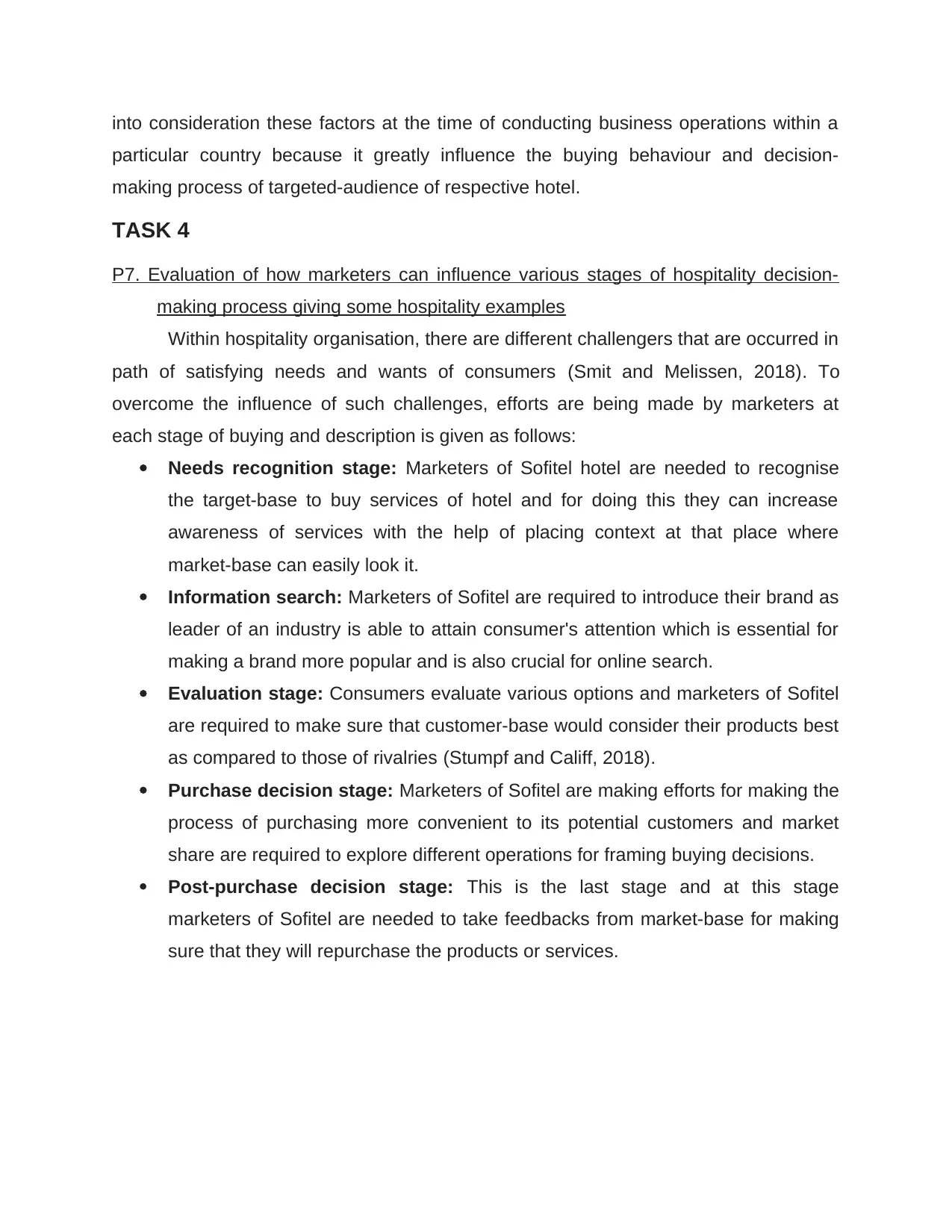
into consideration these factors at the time of conducting business operations within a
particular country because it greatly influence the buying behaviour and decision-
making process of targeted-audience of respective hotel.
TASK 4
P7. Evaluation of how marketers can influence various stages of hospitality decision-
making process giving some hospitality examples
Within hospitality organisation, there are different challengers that are occurred in
path of satisfying needs and wants of consumers (Smit and Melissen, 2018). To
overcome the influence of such challenges, efforts are being made by marketers at
each stage of buying and description is given as follows:
Needs recognition stage: Marketers of Sofitel hotel are needed to recognise
the target-base to buy services of hotel and for doing this they can increase
awareness of services with the help of placing context at that place where
market-base can easily look it.
Information search: Marketers of Sofitel are required to introduce their brand as
leader of an industry is able to attain consumer's attention which is essential for
making a brand more popular and is also crucial for online search.
Evaluation stage: Consumers evaluate various options and marketers of Sofitel
are required to make sure that customer-base would consider their products best
as compared to those of rivalries (Stumpf and Califf, 2018).
Purchase decision stage: Marketers of Sofitel are making efforts for making the
process of purchasing more convenient to its potential customers and market
share are required to explore different operations for framing buying decisions.
Post-purchase decision stage: This is the last stage and at this stage
marketers of Sofitel are needed to take feedbacks from market-base for making
sure that they will repurchase the products or services.
particular country because it greatly influence the buying behaviour and decision-
making process of targeted-audience of respective hotel.
TASK 4
P7. Evaluation of how marketers can influence various stages of hospitality decision-
making process giving some hospitality examples
Within hospitality organisation, there are different challengers that are occurred in
path of satisfying needs and wants of consumers (Smit and Melissen, 2018). To
overcome the influence of such challenges, efforts are being made by marketers at
each stage of buying and description is given as follows:
Needs recognition stage: Marketers of Sofitel hotel are needed to recognise
the target-base to buy services of hotel and for doing this they can increase
awareness of services with the help of placing context at that place where
market-base can easily look it.
Information search: Marketers of Sofitel are required to introduce their brand as
leader of an industry is able to attain consumer's attention which is essential for
making a brand more popular and is also crucial for online search.
Evaluation stage: Consumers evaluate various options and marketers of Sofitel
are required to make sure that customer-base would consider their products best
as compared to those of rivalries (Stumpf and Califf, 2018).
Purchase decision stage: Marketers of Sofitel are making efforts for making the
process of purchasing more convenient to its potential customers and market
share are required to explore different operations for framing buying decisions.
Post-purchase decision stage: This is the last stage and at this stage
marketers of Sofitel are needed to take feedbacks from market-base for making
sure that they will repurchase the products or services.
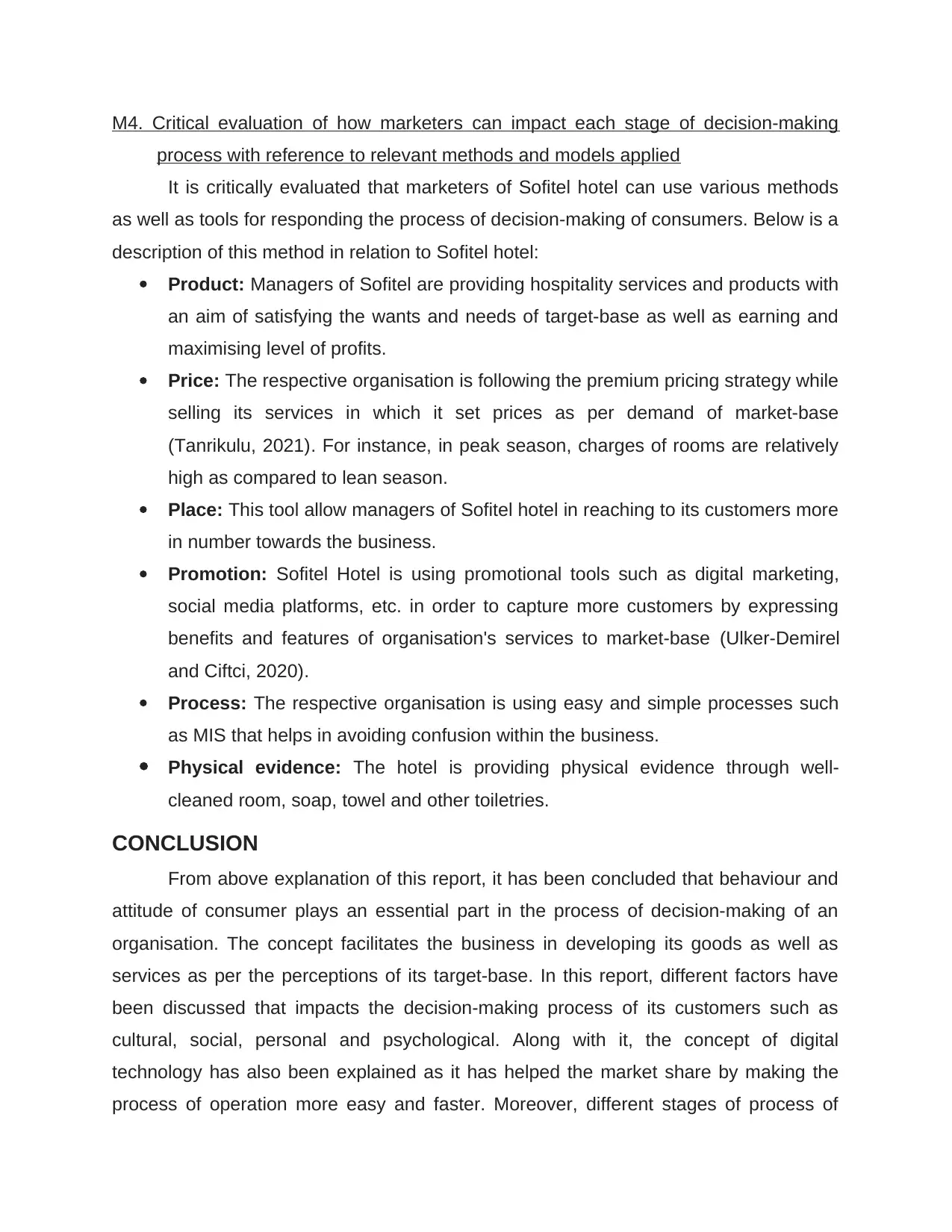
M4. Critical evaluation of how marketers can impact each stage of decision-making
process with reference to relevant methods and models applied
It is critically evaluated that marketers of Sofitel hotel can use various methods
as well as tools for responding the process of decision-making of consumers. Below is a
description of this method in relation to Sofitel hotel:
Product: Managers of Sofitel are providing hospitality services and products with
an aim of satisfying the wants and needs of target-base as well as earning and
maximising level of profits.
Price: The respective organisation is following the premium pricing strategy while
selling its services in which it set prices as per demand of market-base
(Tanrikulu, 2021). For instance, in peak season, charges of rooms are relatively
high as compared to lean season.
Place: This tool allow managers of Sofitel hotel in reaching to its customers more
in number towards the business.
Promotion: Sofitel Hotel is using promotional tools such as digital marketing,
social media platforms, etc. in order to capture more customers by expressing
benefits and features of organisation's services to market-base (Ulker-Demirel
and Ciftci, 2020).
Process: The respective organisation is using easy and simple processes such
as MIS that helps in avoiding confusion within the business.
Physical evidence: The hotel is providing physical evidence through well-
cleaned room, soap, towel and other toiletries.
CONCLUSION
From above explanation of this report, it has been concluded that behaviour and
attitude of consumer plays an essential part in the process of decision-making of an
organisation. The concept facilitates the business in developing its goods as well as
services as per the perceptions of its target-base. In this report, different factors have
been discussed that impacts the decision-making process of its customers such as
cultural, social, personal and psychological. Along with it, the concept of digital
technology has also been explained as it has helped the market share by making the
process of operation more easy and faster. Moreover, different stages of process of
process with reference to relevant methods and models applied
It is critically evaluated that marketers of Sofitel hotel can use various methods
as well as tools for responding the process of decision-making of consumers. Below is a
description of this method in relation to Sofitel hotel:
Product: Managers of Sofitel are providing hospitality services and products with
an aim of satisfying the wants and needs of target-base as well as earning and
maximising level of profits.
Price: The respective organisation is following the premium pricing strategy while
selling its services in which it set prices as per demand of market-base
(Tanrikulu, 2021). For instance, in peak season, charges of rooms are relatively
high as compared to lean season.
Place: This tool allow managers of Sofitel hotel in reaching to its customers more
in number towards the business.
Promotion: Sofitel Hotel is using promotional tools such as digital marketing,
social media platforms, etc. in order to capture more customers by expressing
benefits and features of organisation's services to market-base (Ulker-Demirel
and Ciftci, 2020).
Process: The respective organisation is using easy and simple processes such
as MIS that helps in avoiding confusion within the business.
Physical evidence: The hotel is providing physical evidence through well-
cleaned room, soap, towel and other toiletries.
CONCLUSION
From above explanation of this report, it has been concluded that behaviour and
attitude of consumer plays an essential part in the process of decision-making of an
organisation. The concept facilitates the business in developing its goods as well as
services as per the perceptions of its target-base. In this report, different factors have
been discussed that impacts the decision-making process of its customers such as
cultural, social, personal and psychological. Along with it, the concept of digital
technology has also been explained as it has helped the market share by making the
process of operation more easy and faster. Moreover, different stages of process of
⊘ This is a preview!⊘
Do you want full access?
Subscribe today to unlock all pages.

Trusted by 1+ million students worldwide
1 out of 15
Related Documents
Your All-in-One AI-Powered Toolkit for Academic Success.
+13062052269
info@desklib.com
Available 24*7 on WhatsApp / Email
![[object Object]](/_next/static/media/star-bottom.7253800d.svg)
Unlock your academic potential
Copyright © 2020–2026 A2Z Services. All Rights Reserved. Developed and managed by ZUCOL.

